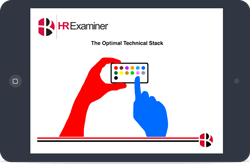It’s easier to rename an existing product with a hot buzzword than do the hard work of new product development. This is the way that great ideas like “talent pool” and “talent pipeline” have become shorthand for the more apt “email list”. Read more in this week’s Feature: Buzzwords.
It’s time to rethink our time, our work, our days, our values, and how we want to spend our lives. It’s time to design our relationships with our fears, our jobs, our families, our companies, and each other, in richer and more interesting ways.
The idea that great people should be retained in their jobs for a long time is the exact opposite of growth and innovation. In Retaining Water, John Sumser opens this week’s Employee Retention double feature by illustrating how a highly successful retention system has backfired on the U.S. Federal Government. In his follow up piece, Retaining Walls, John explores the risks of retention programs in greater depth.
The world is changing fast. This week’s links point to the global movement against high executive pay, complexity thinking, the importance of context in visualization, pay for play ethics and a review of last week’s Tapestry conference.
Last week, I spent a day in Nashville with the 100 brightest minds in graphic and narrative visualization. The subject is important to HR and the rest of the organization. As we get buried in massive volumes of information, graphic and narrative visualization techniques are the keys to survival.
Hiring and Keeping the Best People is a standard goal in most organizations. Identifying key talent and promoting them is such a core part of conventional wisdom that we take it for granted. Most leaders aspire to be surrounded by trusted colleagues who are well seasoned and deeply experienced.
Successful retention programs caused the government to lose its touch with the real changing market dynamics of acquiring and maintaining employees. As a result, the restaffing of the government will require increased pay, modified benefits and a host of alternative approaches.
To show that someone is an independent contractor, you generally have to give independent contractors discretion over how they perform their work; they tend to use their own equipment, tools and resources; and they usually work by the project instead of for an indefinite period.
The common thread is the future of HR. In order to communicate the onruch of human capital data, HR Departments will have to master visualization. This week’s links look at the graphic side of the question. Coming soon, the narrative visualization toolset.
Today, I’m attending the Tapestry conference in Nashville. Organized by Tableau, the conference is an intimate gathering of people interested in data visualization. The theme of the conference is ‘weaving stories and data’.












Recent Comments